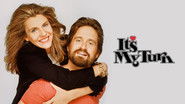sirenebern
I enjoyed this movie even though the script was clumsily written. Kate (Clayburgh) is an attractive mathematician and instructor at a Chicago university and lives with her divorced boyfriend, Homer (Grodin), a developer. They seem to have a pleasant, but not particularly romantic or close relationship. Kate goes to NYC alone to attend both her widowed father's wedding and a job interview for a high-paying position in Manhattan. She meets Ben (Douglas), the son of her new stepmother and a retired baseball player who's unhappily married to a wife who is away (we never see her). A whirlwind romance between Kate and Ben causes her to question what she really wants in her career and personal life. Douglas is very sexy in this role, and blends an earthy confidence and openness about his feelings with a touch of cynicism.Clayburgh played this same basic role in the much better-written and directed "An Unmarried Woman" (by Paul Mazursky) a few years earlier, but I still related to Kate's feeling of being at a crossroads in her life, wanting to take "her turn," and contemplating imperfect or risky choices in order to "go for it." Career ambition and love are equally important to her. Both Clayburgh and Douglas are appealing and attractive on screen. They both seem like mature individuals who are nonetheless confused about which choices to make in life. A better script would have made this a much stronger film about a topic that resonates with a lot of people over 35.Both the writer and director are women, so I think the focus is very much on women of that era exploring new opportunities that would not have been open to their mothers. Yet old-fashioned romance and commitment are shown as worthy ideals.
moonspinner55
Before "Wall Street" and "Fatal Attraction" put him on Hollywood's A-list, Michael Douglas kicked around with secondary roles in an assortment of comedies and dramas, and he was usually miscast. Either playing the smartass cameraman in "The China Syndrome" or the judge in "The Star Chamber", Douglas exuded confidence but no star-wattage. In "It's My Turn", a sort-of feminist comedy-drama second-biller for "An Unmarried Woman", Douglas is an ex-pro ballplayer with a scruffy beard who dates teacher Jill Clayburgh, the Unmarried Woman herself, who apparently hadn't used up all her feminist angst. Written and directed by women (Eleanor Bergstein and Claudia Weill, respectively), the movie wobbles around from scene to scene without a hope in hell of satisfying an audience of either sex. Clayburgh tries out different bits of shtick, but this persona (a brilliant-but-klutzy gal on the go) isn't funny or very interesting. Poor Charles Grodin is stuck yet again playing third fiddle, while Douglas is amiable and rascally and livens things up briefly (you can feel the movie come to life when he's on-screen). The theme song, sung by Diana Ross and co-written by Carole Bayer Sager, is pretty yet filled with claptrap rhetoric and fantasy delusions ("I've given up the truth/To those I've tried to please"). "It's My Turn" ends up pleasing nobody. *1/2 from ****
MarieGabrielle
bad product. Can anyone today direct a real film about women in NYC? I love Jill Clayburgh and Steven Hill. And this film did not do either of them justice. Granted, 1980 was a strange year. But did women still have to wear stiletto heels while teaching college mathematics? At this point in time, audiences shifted to a new generation. Yes, Fatal Attraction came out with Michael Douglas- there was a new edge. But there was still a theme, a story.My primary complaint with this film is the trite stereotypes (Douglas as a baseball star), Hill as a Jewish businessman. We still see these portrayals today. It is tiresome.While Clayburgh is an excellent actress, we do not get see her act, while she acts the "neurotic white woman in an upscale hotel in NYC" It really is over done; in the most basic sense of the word. If you want to see a good NY film about mid-life crisis, watch Woody Allen's "Crimes and Misdemeanors"...light years ahead of this film in the sense of direction and projection. 2/10
Fad King
The final chapter in Jill Clayburgh's unplanned "independent woman" trilogy (the first two were "An Unmarried Woman" and "Starting Over"). This one is from the same writer as "Dirty Dancing," which probably explains why the main character in each is a Jewish woman who is very much "daddy's little girl."Here, the protagonist is perhaps the most glamorous mathematics professor ever (she wears stilettos to class, but earthy gal that she is, removes them while solving equations at the blackboard). She's got relationship issues with her widowed dad who's remarrying, and with her divorced live-in boyfriend, plus she's conflicted about whether to take a new job in a new city that pays much more, but won't allow her to continue her research. She breezily describes her various complications as "modern problems," which tells you that the creators here felt they were at the very cutting edge of portraying the quintessential "liberated" woman. Laura Linney's character in "You Can Count On Me" had a similarly complicated life, but that film didn't feel the need for its characters to be so self-aware.Michael Douglas enters the picture to help her figure out where/how to get the healthy, giving relationship that everyone around her seems to have, and that therefore is "her turn" to get (get it?)This is a decent movie that actually doesn't feel particularly dated, (save for Clayburgh's Oscar-bait "big scene" towards the end) despite its obvious 70's era feminist overtones. But perhaps because of its agenda, the romance doesn't exactly sweep you off your feet.As with most movies from the 80s, part of the fun is seeing what stars/faces of the future show up. Here, we get a young Daniel Stern, almost unrecognizable as Clayburgh's star pupil, and future "Law and Order" District Attorneys Steven Hill and Dianne Wiest.




